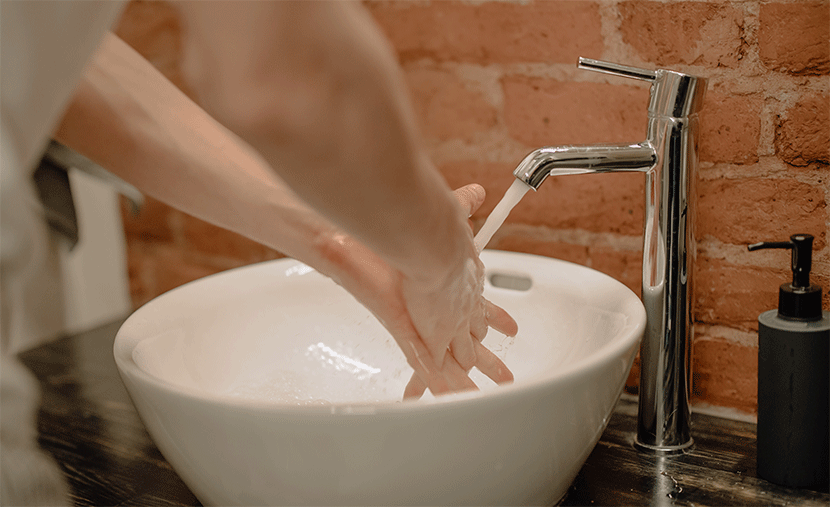Blog
Sensible hygiene practices – or OCD? It’s a fine line.
As we’re in the midst of a pandemic (which by their very nature are health-related), we’re being continually told to practise good hygiene. But there is a fine line between ‘good’ hygiene practises and ‘obsessive’ ones. So how do you know where to draw that line? We’ll take you through some of the common signs of contamination-related OCD – and when it might be time to seek professional help.
The advice is consistent – heighten your hygiene
Whether it’s our Federal Government or the World Health Organization, the word from authorities has been clear and consistent:
- Wash your hands more frequently (and for a longer time)
- Clean and disinfect high-touch surfaces regularly
- Maintain a physical distance from others in public areas
Important advice, right? But for some people, these routines are all too familiar.
People who suffer from contamination-related OCD are likely to have been following these practices long before the coronavirus outbreak.
So, what do they do in response to these recommendations?
They ramp it up.
And what does it mean for those who have never suffered from OCD? It can create new unhealthy patterns of behaviour – and a cycle that’s hard to break.
Let’s take it back a step: what is OCD?
Put simply, OCD is the presence of obsessions, compulsions, or both. They must be time consuming (i.e. taking up at least one hour per day) or cause you significant distress.
But what does this all mean?
- Obsessions are intrusive thoughts that are automatic, unwanted and distressing. People try to ‘ignore’ these thoughts by replacing them with another thought or action.
Remember though: everyone experiences unwanted thoughts from time to time. It’s when we give them too much meaning (by ruminating or catastrophising over them) that compulsive behaviour can result – and potentially, the cycle of OCD.
- Compulsions are repetitive behaviours, performed in response to intrusive thoughts. They’re aimed at preventing or reducing distress.
For example, imagine you have an itchy knee. So, to alleviate the itch, you scratch your knee. But what if you knew that scratching your knee was more harmful than helpful, like compulsions are in OCD? Resisting the scratching may be uncomfortable, but tolerable. With OCD however, resisting compulsions can cause incredible distress.
This is where coronavirus comes in
Contamination-related OCD issues are compounded during a virus outbreak because the disorder craves certainty, which is something we’re all lacking right now.
Coronavirus has also provided a seemingly rational justification: if I don’t wash my hands, someone I know will get sick… or potentially die!
And that means there’s now more reason to believe that such rituals are necessary.
Without getting too technical, OCD results from an interaction of our genes, beliefs, personality factors and the environment. This means that in the current situation, it’s easy for people with a genetic or biological predisposition to ‘accidentally learn’ OCD.
And it usually plays out like this: health organisations recommend we wash our hands regularly, so we do. Then we continue to do it. And continue again, on and on – intensifying it incrementally, until those of us who are predisposed, may reach a full-scale OCD response.
How to prevent the full-scale OCD response
It can be hard to know when to seek professional help. Especially when armed with information like:
- Experiencing intrusive thoughts is normal
- During a pandemic we should up our hygiene practices
That’s why you need to consider the frequency and intensity of your obsessive thoughts and compulsive behaviours. Start by asking yourself these questions:
- Do my thoughts and compulsions take up a significant portion of my time (maybe they interrupt other activities)?
- When I try to resist compulsions (e.g. cleaning, handwashing, etc.), is it so distressing that I have trouble focusing on other activities?
If you answered yes to these questions, it could be time to talk to a professional. It doesn’t necessarily mean you have OCD but seeking help early can prevent it from developing into something unmanageable.
If we’re meant to practise good hygiene, do I have to change my habits?
We often hear, ‘can’t I just leave things as they are?’. Which now holds even more validation because people are being encouraged to wash their hands, clean scrupulously and avoid contact with others.
The short answer is yes, you can leave things as they are.
But remember, doing nothing is only beneficial to present-you. What about future-you? Leaving things as they are may continue the OCD cycle, further embedding it into your everyday behaviour.
And once coronavirus is a thing of the past, you could find yourself stuck in a pattern of unhealthy rituals.
Still unsure? Imagine that instead of itchy, your knee is now sore. But you continue certain activities (such as walking) that worsen the pain. Maybe you were given some rehab exercises to do. Knowledge is certainly power, but simply knowing what you should and shouldn’t be doing won’t stop your pain experience. Only changing your behaviour will.
The good news is, OCD is treatable. And there are steps you can take to avoid it coming to full fruition. Even if you don’t think you’ve reached that point, our psychologists can give you the guidance you need. Call us now to book an appointment.

